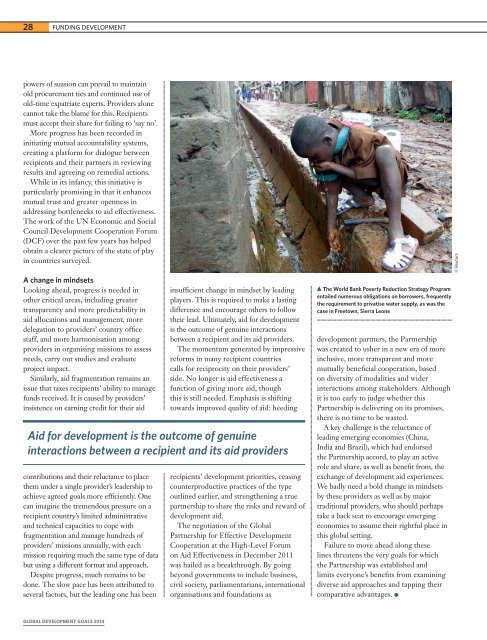FAMBB
FAMBB
FAMBB
You also want an ePaper? Increase the reach of your titles
YUMPU automatically turns print PDFs into web optimized ePapers that Google loves.
28 FUNDING DEVELOPMENTpowers of suasion can prevail to maintainold procurement ties and continued use ofold-time expatriate experts. Providers alonecannot take the blame for this. Recipientsmust accept their share for failing to ‘say no’.More progress has been recorded ininitiating mutual accountability systems,creating a platform for dialogue betweenrecipients and their partners in reviewingresults and agreeing on remedial actions.While in its infancy, this initiative isparticularly promising in that it enhancesmutual trust and greater openness inaddressing bottlenecks to aid effectiveness.The work of the UN Economic and SocialCouncil Development Cooperation Forum(DCF) over the past few years has helpedobtain a clearer picture of the state of playin countries surveyed.A change in mindsetsLooking ahead, progress is needed inother critical areas, including greatertransparency and more predictability inaid allocations and management, moredelegation to providers’ country officestaff, and more harmonisation amongproviders in organising missions to assessneeds, carry out studies and evaluateproject impact.Similarly, aid fragmentation remains anissue that taxes recipients’ ability to managefunds received. It is caused by providers’insistence on earning credit for their aidinsufficient change in mindset by leadingplayers. This is required to make a lastingdifference and encourage others to followtheir lead. Ultimately, aid for developmentis the outcome of genuine interactionsbetween a recipient and its aid providers.The momentum generated by impressivereforms in many recipient countriescalls for reciprocity on their providers’side. No longer is aid effectiveness afunction of giving more aid, thoughthis is still needed. Emphasis is shiftingtowards improved quality of aid: heedingAid for development is the outcome of genuineinteractions between a recipient and its aid providerscontributions and their reluctance to placethem under a single provider’s leadership toachieve agreed goals more efficiently. Onecan imagine the tremendous pressure on arecipient country’s limited administrativeand technical capacities to cope withfragmentation and manage hundreds ofproviders’ missions annually, with eachmission requiring much the same type of databut using a different format and approach.Despite progress, much remains to bedone. The slow pace has been attributed toseveral factors, but the leading one has beenrecipients’ development priorities, ceasingcounterproductive practices of the typeoutlined earlier, and strengthening a truepartnership to share the risks and reward ofdevelopment aid.The negotiation of the GlobalPartnership for Effective DevelopmentCooperation at the High-Level Forumon Aid Effectiveness in December 2011was hailed as a breakthrough. By goingbeyond governments to include business,civil society, parliamentarians, internationalorganisations and foundations asThe World Bank Poverty Reduction Strategy Programentailed numerous obligations on borrowers, frequentlythe requirement to privatise water supply, as was thecase in Freetown, Sierra Leonedevelopment partners, the Partnershipwas created to usher in a new era of moreinclusive, more transparent and moremutually beneficial cooperation, basedon diversity of modalities and widerinteractions among stakeholders. Althoughit is too early to judge whether thisPartnership is delivering on its promises,there is no time to be wasted.A key challenge is the reluctance ofleading emerging economies (China,India and Brazil), which had endorsedthe Partnership accord, to play an activerole and share, as well as benefit from, theexchange of development aid experiences.We badly need a bold change in mindsetsby these providers as well as by majortraditional providers, who should perhapstake a back seat to encourage emergingeconomies to assume their rightful place inthis global setting.Failure to move ahead along theselines threatens the very goals for whichthe Partnership was established andlimits everyone’s benefits from examiningdiverse aid approaches and tapping theircomparative advantages.© ReutersGLOBAL DEVELOPMENT GOALS 2014


